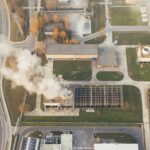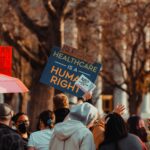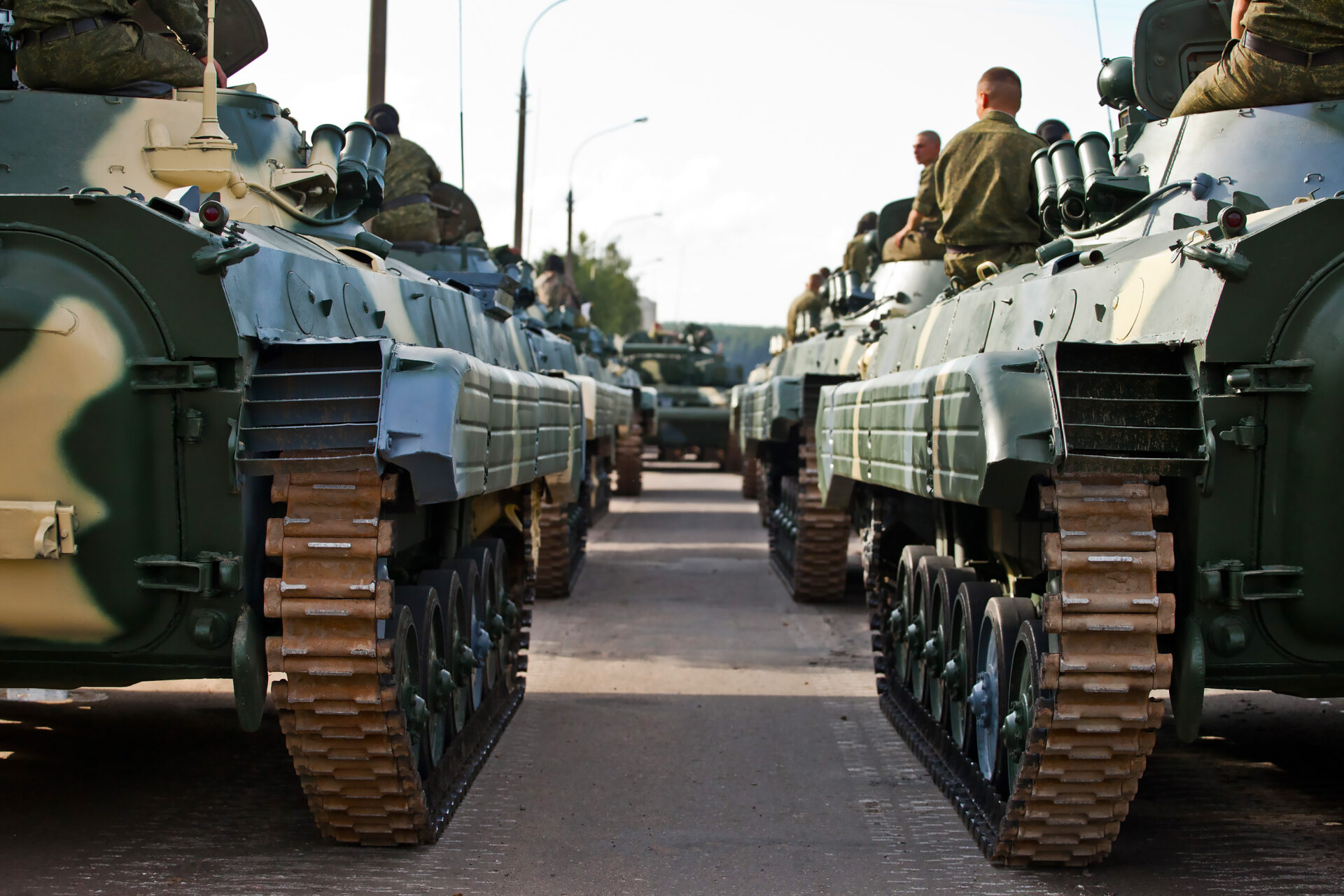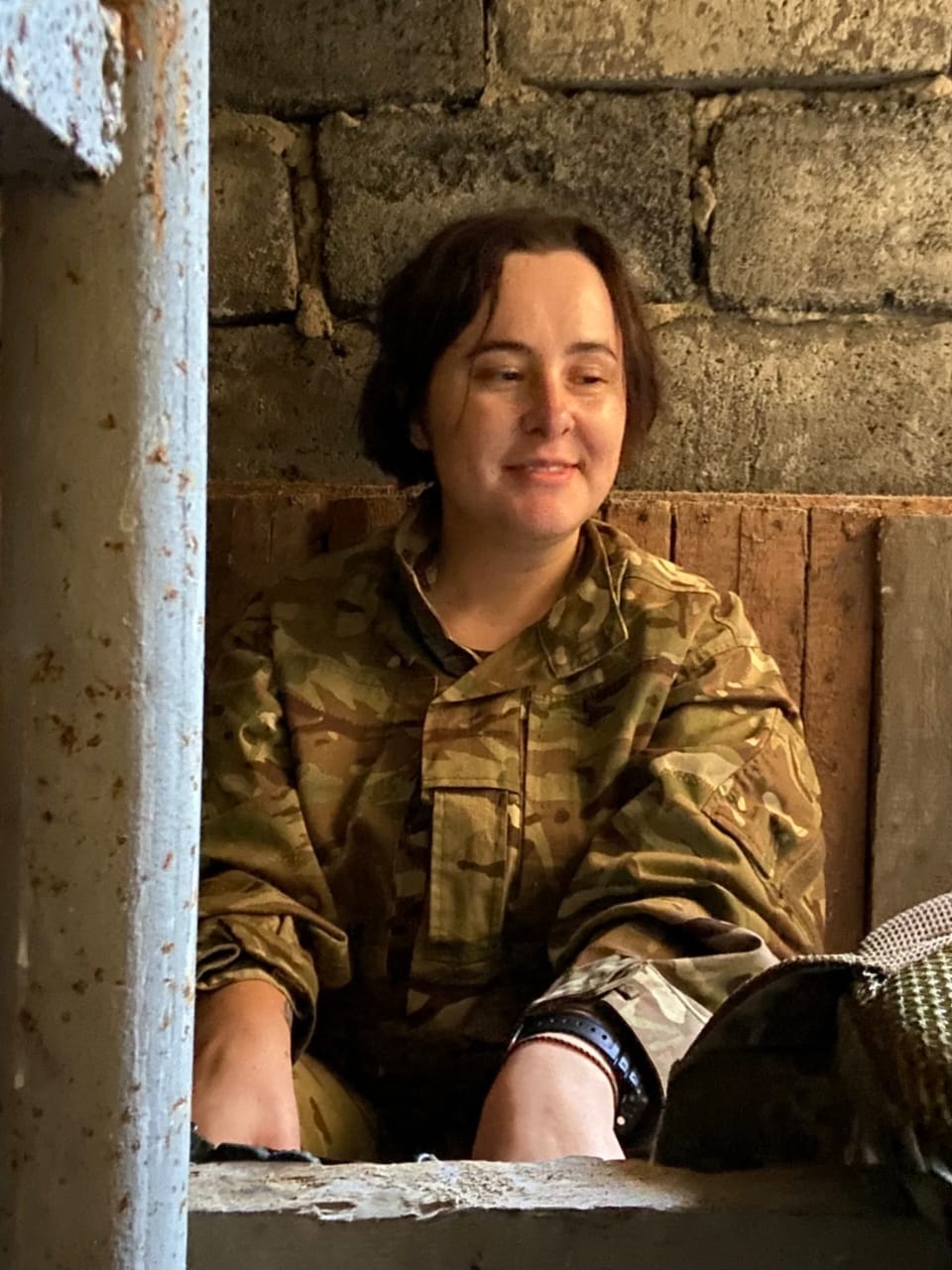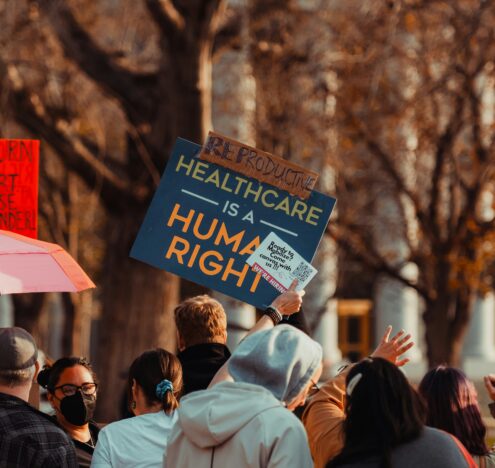The woman expected that Russia may invade Ukraine in that fateful February of 2022, so she made some preparations. She took a one-day course on medical aid, and in the early days of the full-scale war, started organizing psychological support groups — all while hiding from the missiles in the Kyiv subway and trying to get into the Territorial Defense to protect her country.
“I went to the military commission to sign up, but I didn’t even reach it.” Alina remembered how in late February, she was trying to join the army. “At the entrance, there was a security guy. He told me: ‘You can write your name in this book, but they do not take girls unless they are professional medics.’ And I was not,” she said.
Despite this and the lack of support from her own family, Alina persisted.
She had an acquaintance in a military unit, who introduced her to the head medic there.
“The doctor asked: ‘Are you afraid of blood?’ Alina recalled. “I said: ‘No.’ ‘Okay, let’s go sign you up for the Armed Forces.’ So I did my application, and fifteen minutes later they gave me a gun.”
In the Army
“I became the senior medic of the squadron right away,” Alina said. “I started going to block posts in Kyiv even though I was not required to — just so I lived in the same rhythm as everyone else.”
It looked like this: the volunteer stood for three hours at a security checkpoint at the Victory Prospect, one of the most important parts of Kyiv. Then, she had six hours of rest, and then, the same routine again, all the time.
“I was going there with my gun,” Alina added. “I had no bulletproof vest. I got winter pants and a light jacket only, but I was happy with the pants still. On top of the light jacket, I wore an additional one, and on top of that, I put on my military uniform so it looked a bit more formal. This is how I went to the posts. There was shooting, and there were rockets and missiles nearby.”
Alina started her work on March 5, 2022. She had no helmet, and her unit had no army food but local restaurants cooked and brought food for them. It was difficult to provide anything logistically because there were heavy battles around Kyiv. Besides, there was not enough ammunition for everyone. Later, Ukraine started getting aid from different countries, and logistics improved with the Russians retreating, so the army got better equipped.
In the early days, there was also no real medical training. Alina’s skills were limited at best back then, all she had was that one-day training from before the invasion plus her bachelor’s degree in psychology.
However, there was a shortage of professional medics during these early days of the war, which meant a lot of self-education for Alina. She also asked advice from more experienced doctors as she studied on her own. “I did not get any education on tactical medicine at first,” she recalled. “Later, my teammates and I got good and accessible classes so we studied there. We kind of went illegally because the head medic of the entire unit was against this. He said he’d train us himself but ended up doing nothing.”
During the early days, her squadron did not have any wounded, but it also had no other medics. Alina had access to a limited amount of medicines and a large number of people with high blood pressure among the members of the Territorial Defense units in Kyiv she was serving. Back then, COVID was also going strong.
A medic is always waiting for something to happen, it’s their responsibility to be on call, ready to treat the wounded after an attack.
Later, Alina’s skills improved greatly after months of practical work and real classes in tactical medicine. The system also improved over time. Now she has a platoon medical assistant with the right education, and there are experts from the medical unit who advise her as well as the battalion medic who can treat the patients.
Loss
“After Kyiv, I moved to Kyiv region, on the border with Belarus,” Alina recalled. “There was always a big threat of invasion as troops on the other side were acting provocatively. They also used their drones, but they never invaded.”
Afterward, the woman ended up in the east, in Donbas.
In her squadron, she quickly got to know the people and saw how soldiers with very different worldviews worked together.
“As a senior military medic of the squadron, I take care of all the wounded,” Alina said. “Those with heavy wounds require a lot of attention. They are relocated from hospital to hospital, and they need a lot of stuff. I also take care of their papers because in the army, a person cannot go to a doctor without a rapport that’s signed by the commander, and then the head medic needs to write a referral, which later needs to be registered in the squadron,” she added.
Army bureaucracy is disheartening. Yet, it pales compared to the actual work of saving lives. The routine is that there is no routine but the days are always different. A medic is always waiting for something to happen, it’s their responsibility to be on call, ready to treat the wounded after an attack. In between, the medics check their supplies, train soldiers on first aid, and wait again.
Alina explained that her squadron was lucky because the fighters were not wounded right away.
“Due to the specifics of this war, the main thing is to train the soldiers,” the medic explained. “They are the ones next to wounded comrades, and our key task was to teach them how to behave around them. I am very proud of my fellow soldiers because they learned how to take care of themselves and how to aid others. This is crucial because they can be in a situation when they are hurt, and there is nobody around.”
For Alina, there is a big difference between taking care of a stranger and taking care of one’s comrade. Knowing a soldier makes it much harder to see their pain or death. While on the frontline, Alina has seen a lot of deaths of comrades who became dear to her.
“The worst part is seeing the loss of people I know,” she said. “I know personally and am often friends with the soldiers who later get wounded. I have friends among the killed ones. I knew their wives. These were the people with whom we slept, ate, and lived together.”
“A medic got killed,” Alina sighed. “His name was Yura, call sign ‘Tourist.’ He was my close friend from the early days. He promised to come to my wedding. But he won’t come there. I was friends with his wife. This is the worst.”
“We Should Not Have Been Here”
Alina says that does not take care of herself psychologically while on the frontline. For her, it’s a problem for later, something impossible to deal with while the fighting continues.
“You cannot do anything to feel good in these conditions,” Alina reflected. “There are some coping mechanisms; they work and protect you, which is great. Maybe, if we finished implementing the army reforms before the big war, we would have a differently built military psychology, so we would have mechanisms. However, for now, there are no such mechanisms. Also, we have very heavy battles, a very difficult enemy, and hard conditions. This is normal to feel that way.”
“There is nothing good about the war,” the medic added. “It should not have happened, and we should have all been home. I would like other countries to support us as much as possible so their own citizens would not need to go to fight. I do not recommend this to anyone. I would not have met these great army people otherwise, but we should not have been here.”
Alina admits that she never wanted to join the army. Most members of the army had full civilian lives and did not plan to become soldiers. They took arms because they saw no choice but to fight for Ukraine.
Alina wants to shed light on soldiers who, like her, are defending their homeland. She started a podcast that collects testimonies of her colleagues with the hope that these would inspire more people to join the army. The podcast addresses military-related issues such as sexism, diversity, or unity.
“Once, before a battle, I was talking to one of our soldiers and telling him that it would be good to record a podcast with him,” she remembered. She added, “He said he’d do it later but then, he died, so that later never happened. That’s why I don’t have time to postpone these stories. I record them now. I am not sure how they are perceived, and I do not think about it much. I just think it is important to talk about the fact that our army consists of a big part of volunteers who used to work in IT, civil society, or media. They are all soldiers now because we are at war.”
“I heard volunteers’ stories all the time, and I realized it was necessary to record them now while these people are still alive, and before this topic became some marble tablet in a public school,” the medic continued. “It is necessary to hear and know this now.”
Alina believes that spreading the word can also help keep the war relevant for people outside of Ukraine so her home country could get more aid to stop the Russian aggression.
“Right now, we, with our blood, are stopping a huge menace for the entire Europe,” she said. “And with our blood, we’re also winning the world some time to unite, transform, and be ready to fight off this menace. I hope the world will use this time as effectively as possible. Otherwise, they are next. Russia would like to prolong this war, so it becomes forgotten.”







